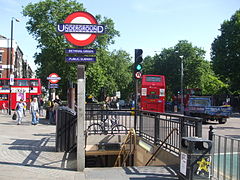Bethnal Green, London
| Bethnal Green | |
|---|---|
 Bethnal Green tube station |
|
| Bethnal Green shown within Greater London | |
| Population | 27,849 (Bethnal Green North and Bethnal Green South wards 2011) |
| OS grid reference | TQ345825 |
| • Charing Cross | 3.3 mi (5.3 km) SW |
| London borough | |
| Ceremonial county | Greater London |
| Region | |
| Country | England |
| Sovereign state | United Kingdom |
| Post town | LONDON |
| Postcode district | E2 |
| Dialling code | 020 |
| Police | Metropolitan |
| Fire | London |
| Ambulance | London |
| EU Parliament | London |
| UK Parliament | |
| London Assembly | |
Bethnal Green is a district mostly in the London Borough of Tower Hamlets and partly in the London Borough of Hackney. Located 3.3 miles (5.3 km) northeast of Charing Cross, it was historically a hamlet in the ancient parish of Stepney, Middlesex.
Following population increases caused by the expansion of London during the 18th century, it was split off from Stepney as the parish of Bethnal Green in 1743, becoming part of the Metropolis in 1855 and the County of London in 1889. The parish became the Metropolitan Borough of Bethnal Green in 1900 and the population peaked in 1901, entering a period of steady decline which lasted until 1981.
The economic history of Bethnal Green is characterised by a shift away from agricultural provision for the City of London to market gardening, weaving and light industry, which has now all but disappeared. The quality of the built environment had deteriorated by the turn of the 20th century and was radically altered by the aerial bombardment during the Second World War and the subsequent social housing developments. Some 173 people were killed at a single incident at Bethnal Green tube station in 1943. Bethnal Green has formed part of Greater London since 1965.
The place-name Blithehale or Blythenhale, the earliest form of Bethnal Green, is derived from the Anglo-Saxon healh ("angle, nook, or corner") and blithe ("happy, blithe"), or from a personal name Blitha. Nearby Cambridge Heath (Camprichesheth), is unconnected with Cambridge and may also derive from an Anglo-Saxon personal name. The area was once marshland and forest which, as Bishopswood, lingered in the east until the 16th century. Over time, the name became Bethan Hall Green, which, because of local pronunciation as Beth'n 'all Green, had by the 19th century changed to Bethnal Green.
...
Wikipedia

